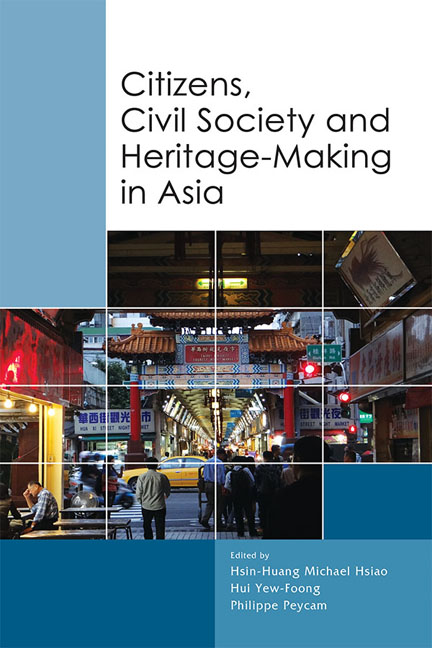Book contents
- Frontmatter
- Contents
- Contributors
- 1 Introduction: Finding the Grain of Heritage Politics
- 2 Heritage, Identity and Power
- 3 Heritage-Making and Post-coloniality in Yangon, Myanmar
- 4 Living Heritage of Ruins? Contesting the Paradox in Trowulan's Majapahit Heritage
- 5 The Reconstruction of Heritage in Rural Vietnam: An Analysis of State and Local Dynamics
- 6 Performing Cultures, Negotiating Identities: The Cultural Politics of Indigenous Cultural Villages in West Malaysia
- 7 Constituting Philippine Filmic and Linguistic Heritage: The Case of Filipino Regional Films
- 8 Encounter and Counter-Narratives of Heritage in Macau
- 9 Cultural Activities of the Chinese Community in Post-war Myanmar
- 10 Chinese Street Opera in Singapore: Heritage or a Vanishing Trade
- 11 Policy Formation and Civil Society Engagement in Heritage-Making in Taiwan: A Historical Examination
- 12 Becoming Taiwanese: Appropriation of Japanese Colonial Sites and Structures in Cultural Heritage-Making — A Case Study on the Wushantou Reservoir and Hatta Yoichi
- 13 Defining Culture in the Heritage Preservation of Taiwanese Veterans’ Villages: The Case of Zuoying
- 14 Tobacco Crop Memories in Taiwan: The Heritage of a Deadly Agriculture
- Index
11 - Policy Formation and Civil Society Engagement in Heritage-Making in Taiwan: A Historical Examination
Published online by Cambridge University Press: 03 January 2018
- Frontmatter
- Contents
- Contributors
- 1 Introduction: Finding the Grain of Heritage Politics
- 2 Heritage, Identity and Power
- 3 Heritage-Making and Post-coloniality in Yangon, Myanmar
- 4 Living Heritage of Ruins? Contesting the Paradox in Trowulan's Majapahit Heritage
- 5 The Reconstruction of Heritage in Rural Vietnam: An Analysis of State and Local Dynamics
- 6 Performing Cultures, Negotiating Identities: The Cultural Politics of Indigenous Cultural Villages in West Malaysia
- 7 Constituting Philippine Filmic and Linguistic Heritage: The Case of Filipino Regional Films
- 8 Encounter and Counter-Narratives of Heritage in Macau
- 9 Cultural Activities of the Chinese Community in Post-war Myanmar
- 10 Chinese Street Opera in Singapore: Heritage or a Vanishing Trade
- 11 Policy Formation and Civil Society Engagement in Heritage-Making in Taiwan: A Historical Examination
- 12 Becoming Taiwanese: Appropriation of Japanese Colonial Sites and Structures in Cultural Heritage-Making — A Case Study on the Wushantou Reservoir and Hatta Yoichi
- 13 Defining Culture in the Heritage Preservation of Taiwanese Veterans’ Villages: The Case of Zuoying
- 14 Tobacco Crop Memories in Taiwan: The Heritage of a Deadly Agriculture
- Index
Summary
In Taiwan the discussion of civil society emerged in the 1980s and peaked in the early 1990s, when the society underwent political democratization. Civil society was considered a public sphere, enjoying relatively autonomy from the control of the state or the market. The birth of civil society in Taiwan came about by the proliferation of non-profit organizations, community organizations, and professional and voluntary groups through continuous social mobilization. Lawmaking was indispensable for the consolidation of civil society. New ordinances, ranging from human rights, environmental regulation to cultural preservation, were brought to the agenda. The emergence of civil society allowed people to leverage themselves from the control of the state and the market. In addition to this, the new Taiwanese identity that took shape in the 1990s reinforced the civil society that was in the making. However, across the turn of the millennium, as the state– society relationship reconfigured, civil society also differentiated. Both the market and the state tried to entrench civil society, which more often than not led to many different voices within civil society. Conflicts among various social groups have become a noticeable feature in the debates and decision-making processes of public affairs.
Against this backdrop we would like to trace the early history of the development of the idea of heritage preservation in Taiwan. The emergence of the heritage preservation movement and related policies is closely intertwined with the changing cultural politics that reflect the contested meanings of national and local identities in Taiwan. Before the lifting of martial law in 1987, civil society had played a significant role in heritagemaking. Since 1987, civil society has further pushed the state to change the laws and policies governing heritage preservation.
The first piece of legislation in this area, the Cultural Heritage Preservation Act, was promulgated in Taiwan in 1982, while the country was still under authoritarian rule. The implementation of the Heritage Act and associated cultural policies inevitably reflected the Chinese nationalist historical narrative; however, at the same time, it created negotiable spaces for diverse narratives through the imported notion of “cultural heritage”, which could be seen as an indirect challenge to the dominant narrative.
- Type
- Chapter
- Information
- Citizens, Civil Society and Heritage-Making in Asia , pp. 232 - 250Publisher: ISEAS–Yusof Ishak InstitutePrint publication year: 2017



